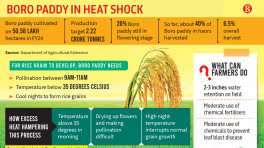Bakery price hike looms if Ukraine war prolongs
Food-makers say alternative wheat sources are available so far, but the rates are high

War between the two major global wheat exporters, Russia and Ukraine, coupled with China's aggressive buying, causes skyrocketing soybean-oil-like concern to local bakery items, noodles and pasta.
Bangladeshi manufacturers said prices of the items and wheat flour may go up if the already tight international supply of the grain does not ease up anytime soon. They say the domestic food industry does not have storage capacity, while the Russia-Ukraine war prolongs with no sign of stopping.
The Russia-Ukraine war that started in the last week of February has raised wheat prices 20% on the international market. Following the conflict, China – one of the major wheat buyers in the global market – has announced an aggressive food grain purchasing plan.
Amid the Covid pandemic, China, with a population of more than 120 crore, started stocking edible oil in 2020. The aggressive buying and a production crunch shot soybean prices to $2,000 per tonne the next year, causing a mass discontent over cooking oil prices in Bangladesh.
For Bangladesh, the alternative wheat sources are India, Canada, Australia, Brazil and Argentina. But these countries offer higher rates than the two battling countries. Besides, they even collectively are not able to tackle the global demand.
Bakery item manufacturers said they have managed the wheat supply crunch so far by either raising product prices slightly or shrinking the product sizes. Then came the month of fasting in April when the demand for bakery items is usually low – providing the producers with a brief respite.
But the food items may face as much as 35% supply crunch after Eid, according to the food industry people.
Redwanur Rahman, general manager of Bashundhara Multi Food Products Limited, said they are still able to buy flour at a higher rate. But the global market may go rowdy and totally out of reach once China revs up the aggressive buying.
"In the case of soyabean, we witnessed how brutal the international market could be with aggressive buying," he told The Business Standard.
Redwanur said they fear an international wheat crisis as early as next monsoon.
Taslim Shahriar, senior assistant general manager of Meghna Group, said alternative wheat sources are available so far, but the rates are high. The situation in the upcoming months completely depends on whether the war prolongs.
Govt relief at risk too
Like the private sector, the government too faces a declining wheat stock. Currently, the government's wheat stock has come down to 1.49 lakh tonnes. With this stock, it is not possible to meet the demand for test relief and food for work programmes in the current fiscal year.
Bangladesh consumes 60 lakh tonnes of wheat annually, while the local production stands at only 12-13 lakh tonnes.
After the Russia-Ukraine war started, the government approved import of 50,000 tonnes of wheat from India at $409 per tonne. The consignment has arrived in the country. On Wednesday, purchase of another 50,000 tonnes of wheat from India was approved at $391 per tonne.
Meanwhile, Canadian wheat rose to $520 from the previous $300 per tonne.
Food ministry officials said traders have not been able to supply wheat even though supply orders have been issued.
The tenders for wheat supply were floated before the war as those mentioned cheap rates. But the grain soared since the war broke out, while the shipping cost also ticked up. The ministry officials said the traders are refraining from supplying wheat fearing further losses.
A prolonged crunch?
The Food Planning and Monitoring Unit of the Ministry of Food conducts research on international and local food stocks. An official of the unit, speaking on the condition of anonymity, told The Business Standard that it is very normal that the international supply will tumble as the two major suppliers are at war. And Bangladesh is also certain to fall into this situation.
"There will be a crisis this year, but it will worsen next season. Because, there is a risk of low production in different countries since the war also clouds fertiliser supply from Russia," the official added.
However, Additional Director of the Food Directorate Mohammad Moniruzzaman said, "There is no problem since we are getting wheat from India. Besides, we are in touch with a number of countries to ensure an uninterrupted supply."
He said Bangladesh has contacted Bulgaria, while Australia and Canada have shown interest for wheat export.
He said importing wheat from Australia or Canada might cost more, but there would be no crisis.
India has increased wheat exports to ease the international supply. But there are doubts about how much the country will be able to meet the global demand.
A BBC report Tuesday states that India has the capacity to export 16 million tonnes of wheat in this fiscal year, according to Ashok Gulati, a professor of agriculture at the Indian Council for Research on International Economic Relations.
"If the WTO allows government stocks to be exported, it can be even higher. This will help cool the global prices and reduce the burden of importing countries around the world," Ashok Gulati told BBC.
"We have enough stocks at the moment. But there are some concerns, and we should not become gung-ho about feeding the world," says Harish Damodaran, a senior fellow at the Centre for Policy Research, a Delhi-based think tank, told BBC.
In February, the United States Department of Agriculture (USDA) said global wheat production might be 776 million tonnes in the 2021-22 fiscal year, which is only 0.1% more than the previous year. Some 208.4 million tonnes of wheat will be sold in the world market at the same time, which is 5% more than the previous year.


 Keep updated, follow The Business Standard's Google news channel
Keep updated, follow The Business Standard's Google news channel















